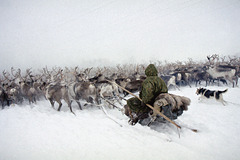The Guardian: Sami reindeer herders face climate disaster

Photo: Lev Fedoseev / RIA Novosti
Sámi reindeer herders in Europe from Sampi – an area that is located in Sweden, Finland, Norway and Russia – are faced with a climate disaster – a warming in the Arctic, which has called into question the preservation of the usual way of life. Writes about this The Guardian.
The Sami are the only indigenous people in Europe.
The problem is compounded by the higher rate of temperature change. Instead of twofold warming in the Arctic, as scientists initially believed, the region is warming four times faster. In July of this year, Sápmi recorded the highest temperature in more than 100 years – 33.6 degrees Celsius.
Lars-Anders Kuhmunen, a reindeer breeder from Kiruna, Sweden's northernmost city, said the winters are warmer. Kuhmunen and other reindeer herders are on the brink of a climate crisis. Deer that have adapted to the harsh conditions of the polar region cannot adapt to warmer climates. The animals use their shovel-like hooves to dig for lichen, the main winter food source, as well as other plants growing under the snow. But finding food is becoming more and more difficult.
The rise in temperature is reflected in precipitation. After the rain, the ground freezes, and the lichen is under the ice, because of which the animals cannot get to it. A thick layer of snow prevents deer from smelling plants. Usually, phenomena such as freezing-thawing and rain and snow are considered normal in the Arctic, but now they have become too frequent and large-scale.
“Reindeer are losing their habitat due to deforestation and mines. My father's generation went skiing with reindeer. We use snowmobiles because the distances are longer, ”said Kuhmunen, a reindeer herder. Reindeer husbandry is already under threat from human expansion as forestry and mining operations move to traditional grazing areas. A Norwegian study found that untouched reindeer habitats, including pastures flooded for hydroelectric dams, have declined by 70 percent over the past century.
The effects of global warming are already manifesting themselves in the form of frequent tundra fires, which have accelerated the destruction of permafrost in the Arctic. Climate change may lead to new natural anomalies.

